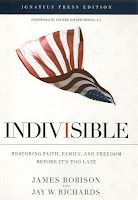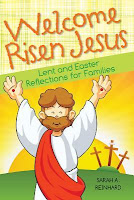Welcome Risen Jesus: Lent and Easter Reflections for Families
Sarah Reinhard
“Why did Jesus die?” If you’re a parent, your kids have probably asked that question. And it’s tough to answer. It’s difficult for small children to wrap their heads around things like Jesus’ passion, atonement, justification, and sacrificial death. Therefore many parents scratch their heads, wondering how to teach kids that Easter is more about Christ and less about candy.
If that sounds like you, Sarah Reinhard is here to help. Sarah, author of the excellent Advent and Christmas reflections, is back with another set for Easter and Lent titled Welcome Risen Jesus: Lent and Easter Reflections for Families (Liguori, paperback, 64 pages).
The book is perfect for families and small children. It’s full of practical guidance and shares the same structure as Sarah’s other book: each day you’ll find a Scripture quote, a short reflection (Think), a prayer (Pray), and a simple activity for kids to enjoy (Act).
As with the other book, I really like the activities. For example, on Holy Thursday Sarah suggests each family member serve in some undesirable way—perhaps scrubbing the toilets or cleaning the doorway carpet. This helps children enter into the liturgical events and understand their rhythm and meaning, even if they don’t understand the theology. The book is full of several other activities that do this as well.
I know Easter is coming to a close, but consider picking up this guide, if only for next year. At just $1.99 it’s a real bargain.
Adam and Eve after the Pill: Paradoxes of the Sexual Revolution
Mary Eberstadt
A couple years ago I visited the Smithsonian Museum of American History, and was intrigued to see an exhibit on the Pill. The content was even more surprising. It was overwhelmingly positive and included several testimonials from women who had been “set free” from domestic bondage, “liberated” from the home to find true “equality” in the world.
By highlighting the dramatic changes introduced by the Pill, and its associated sexual revolution, the exhibit was right. These innovations provoked a huge social shift. At the time, most considered it a good shift. But fifty years later, many are wondering whether these changes were ultimately helpful. Is our “post-liberation” world better off because of the seismic sexual revolution? Are women in a better place now that contraception is widely used and available?
Mary Eberstadt thinks the answer is a firm “No”, and she explains why in her new book, Adam and Eve after the Pill: Paradoxes of the Sexual Revolution (Ignatius Press, hardcover, 175 pages). The groundbreaking text draws on sociology, philosophy, and culture to show how the Pill has been one of the most disastrous inventions our world has ever known. According to Eberstadt, “no single event since Eve first took the apple has been as consequential for relations between the sexes as the arrival of modern contraception.”
Her argument is evidenced through chapters exploring the sexual revolution’s effect on different groups—men, women, children, and young adults. She also takes a look at its impact on cultural values, and the vindication of Pope Paul VI’s prophetic encyclical, Humanae Vitae.
The book makes clear why so many people are second-guessing the Pill today. Many now see how the increase in divorce, pornography, and unhappiness, and the prevalence of abortion, date rapes, hookups, and binge drinking all flow directly from the sexual revolution.
Adam and Eve after the Pill shows how in the end, the Pill and its revolution did not help women—or men for that matter. Its legacy is overwhelmingly negative and has left pain, sadness, and death in its wake.
(If you haven’t already, check out Eberstadt’s 2010 book, The Loser Letters, which provides a delicious, snarky response to modern atheism in the tradition of C.S. Lewis’ Screwtape Letters.)
Indivisible: Restoring Faith, Family, and Freedom Before It’s Too Late
James Robison and Jay Richards
With the recent threats to religious liberty and the upcoming presidential election, a new book by James Robison and Jay Richards couldn’t be timelier. Indivisible: Restoring Faith, Family, and Freedom Before It’s Too Late (Ignatius press, hardcover, 384 pages) covers many of today’s most pressing moral, political, and cultural issues like religious liberty, abortion, marriage, the role of government, poverty, education, and more.
Though clearly conservative, the book steers clear of partisanship, noting that God “doesn’t ride on the back of an elephant or a donkey.” Some might see the book as a revival of the “Religious Right”, which burst onto the scene about thirty years ago. But Robison and Richards are quick to separate themselves from the movement. Instead of aligning Christianity with one particular party they focus more on individual principles and issue.
I liked the strong emphasis on prayer and holiness as solutions to our cultural woes. The authors admit that programs and policies can be helpful and solid principles are worth arguing for. But the greatest world-changing power Christians have is sanctity. If we want to transform the culture we need to first transform ourselves, and that takes a life of prayer and holiness.
I also liked how the authors centered their principles on the family. Pope John Paul II was right: “As the family goes, so goes the nation and so goes the whole world” and the book is saturated with this view. The authors agree that divorce, infidelity, and attempts to redefine marriage are huge threats to our country and culture.
Indivisible isn’t explicitly Catholic, which explains why contraception gets no mention during the chapter on abortion, despite being directly correlated with it. The book is instead a sort of “mere conservatism” and will appeal to conservative Christians from every tradition, an important contribution to the current political dialogue.
(For Catholics there is a special Ignatius Press edition that includes a foreword by Ignatius Press founder, Fr. Joseph Fessio, SJ.)
How Far Can We Go?: A Catholic Guide to Sex and Dating
Leah Perrault and Brett Salkeld
If you’ve ever worked with youth, you know that one of the most confusing topics is sexuality. Young people are bombarded with conflicting messages from the media, entertainment, their families, and from the Church on the purpose and meaning of sex. Alongside that confusion stands raging hormones, new relationships, and questions about love, dating, and relationships.
In How Far Can We Go?: A Catholic Guide to Sex and Dating (Paulist Press, paperback, 112 pages) Leah Perrault and Brett Salkeld provide simple, attractive guidance to much of this confusion. In the book they cover everything from courting to pornography, to intimacy, birth control, marriage, and more.
The book carefully walks the line between an unhealthy rejection of sex, and a capitulation to our culture’s sexual norms. Throughout the pages it stays faithful to the Magisterium and agrees with the Church: sex is good in the right place and the right time. Like the Church, the authors treat relationships and sex as part of a larger picture which includes vocation, the dignity of the body, and the meaning of human relationships.
At a concise 112 pages, How Far Can We Go? is short and digestible for young people. It would be a great gift to any teenager, young adult, or anyone who regularly works with them.




